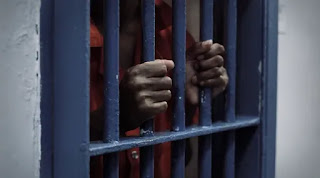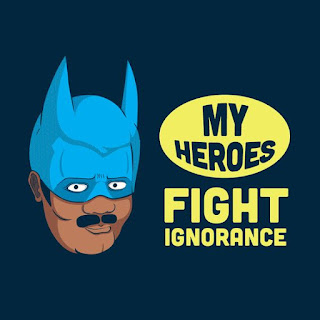Experiences in the Correctional Facility: Part 3
 |
| https://www.indiewire.com/2018/06/american-jail-trailer-roger-ross-williams-cnn-documentary-1201975861/ |
This is the third part of my experience as a mental health therapist working in correctional facilities. My last post was nearly two years ago. It is not going to be filtered, so read at your own accord.
It's been a year and a half since I left my job at the correctional facility. This will be a more personal reflection than my last two posts. As therapist, we are often trained to not speak about our experiences outside of our professional circles. Advocacy is always a part of mental health, but there is a line we like to tell ourselves we have. That our experiences, or jobs, do not affect us. That is "them" and the stories we are told and the lives we enter are only a profession. That it is just what we do --- and that is it.
That is not it. The lines that we draw become ever so thinner depending on the work we do. My experience in correctional facilities redefined my persona as a therapist and how I view mental health. It slowly redefined my personal life as well, in ways I did not notice until I left that setting over a year later.
Witnessing individuals trying to commit, or successfully committing suicide, withdrawing from drugs, isolated in solitary cells for weeks or months at a time, having psychotic episodes (spreading urine, feces, blood, etc.), self-harming with plastic and cutting themselves, etc takes it toil. This happens daily in the correctional facility, hospitals, and some psychiatric residential treatment facilities. Turn over of therapist is high in these environments. There is something we call vicarious trauma that is well known in our field. It is "the emotional residue of exposure that counselors have from working with people as they are hearing their trauma stories and become witnesses to the pain, fear, and terror that trauma survivors have endured." (American Counseling Association) Therapist are well trained to deal with this -- it is part of our profession. However, we are often not trained to deal with trauma as we experience it directly as caregivers. This is direct exposure to repeated traumatic events -- this is direct trauma. In these institutional settings you experience both. I've personally known caregivers (nurses, doctors, officers, etc.) who have experienced their own trauma working.
While I don't think I personally was traumatized, I definitely reshaped my personal life heavily more and more over time to deal with the experiences I had and the stores I was told to mitigate this from happening. Navigating both forms of trauma takes a lot of emotional resources and gymnastics. My life became more structured --- I knew what I was going to wear on each day of the week, what I was eating each day, when I was eating, etc. My sense of time changed. It became more structured to deal with the chaotic day. A day could feel like a week and a week could feel like a month -- depending on what happened that hour.
As you are building relationships with people who have sociopathic tendencies to provide them care, you are also migrating your own psyche. You try to navigate their minds to understand them while keeping your priorities, thoughts --- and world separate."Can I trust what he said? Is she really in pain, or does she want pain killers? Is she masturbating to me, I am wearing the baggy pants today...? Why is he saying that, is he testing me?" The ongoing mental gymnastics spill over into your personal life. You eventually find yourself questioning five different ways one ten minute conversation with someone at the grocery store. Slowly the bleeding starts and you see yourself more and more structuring your world(s) to keep them separate.
The illusion of separation is the dangerous thing. It keeps things going. It is a healthy coping mechanism. But it is not sustainable.
The health care system itself is not designed to support caregivers in these roles. You only have two (2) weeks of vacation, few company holidays, are on call 2-3 weekends out of the month (suicide precautions), and are disincentive from taking sick time. You find yourself not only dealing with people who are currently inmates, but navigating a health care system incentivized to make money first at the cost of the mental well-being of it's employees. Nurses quit weekly and turnover was high. I found myself consciously not remembering the names of the nurses anymore and casually joked, "Well, if she/he lasts a month, I will try to remember their name".
The people you are there to help, and eventually the staff turnover, starts to mirror the constant change in inmates. They become transactional. You slowly stop seeing the person as you redirect your emotional energy to navigate that world in narrow spaces and paths laid out for you. To deal with the daily crisis events, you numb yourself slowly to perform your job duty. You do it. But is it really you anymore? Is it why you got into this to start out with?
It took me about 8-10 months to fully readjust and to start to reflect on my own time there. Until I felt like I was no longer in jail.
The officers, the staff, and the inmates are not the problem. It was rewarding working with them. It was rewarding helping people figure out difficult problems in their own personal lives in psyches, despite the circumstances. To see people change, fail, get back up, and try again. It is not the people. It is the system we have created and pushed these individuals into which is defeating. It is death by a thousand cuts with no support. I have already touched on this in my previous post, but it cannot be said enough. It is an unreal and unsustainable setting, and it pushes you to do and become the same to navigate it.
...And I think Mecklenburg county does a better job than most other counties. But it is still not enough if we want to stop creating the "monsters" we fear. If we really want to help rehabilitate people and keep good staff around who will not just support but also grow in that needed work.
There are no sharp lines that separate professional and personal life when it comes to that work, under those conditions. Every line you draw is narrowed and eventually broken in some way. There is just life, for the individual, and you navigate it the best you can. Some of us do it better than others. It doesn't have to be a chance thing.
I often run into officers in the community since leaving jail and they --- in various ways --- say, "You seem so happy now!" It surprises me every single time. I am and have always been generally an optimistic person. But perhaps the person I had to be while I worked at the jail -- the separation I had to create and the mask I learned to wear to navigate that world, has finally melted away - and they can now see me as I am. It's freeing to be seen as you are, once again.

Comments
Post a Comment